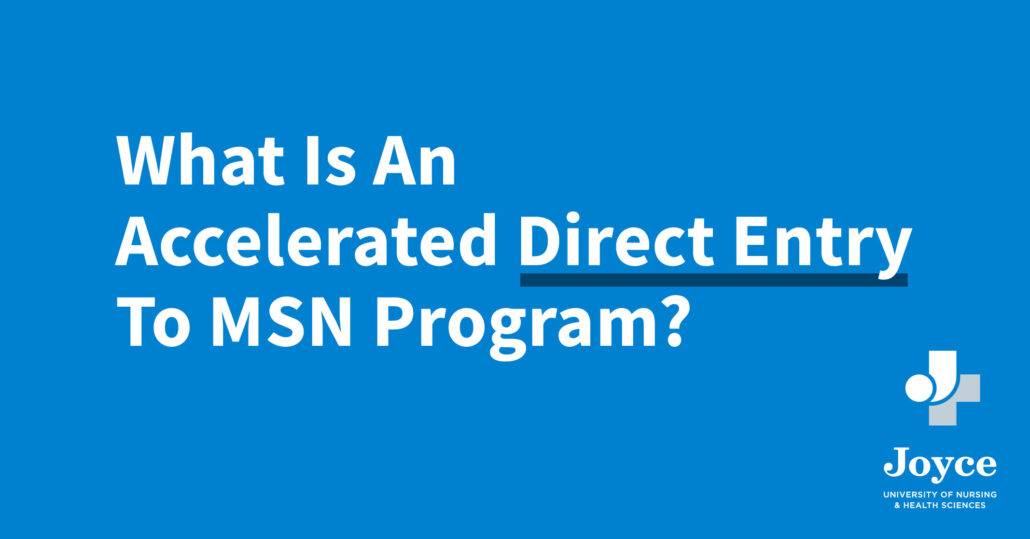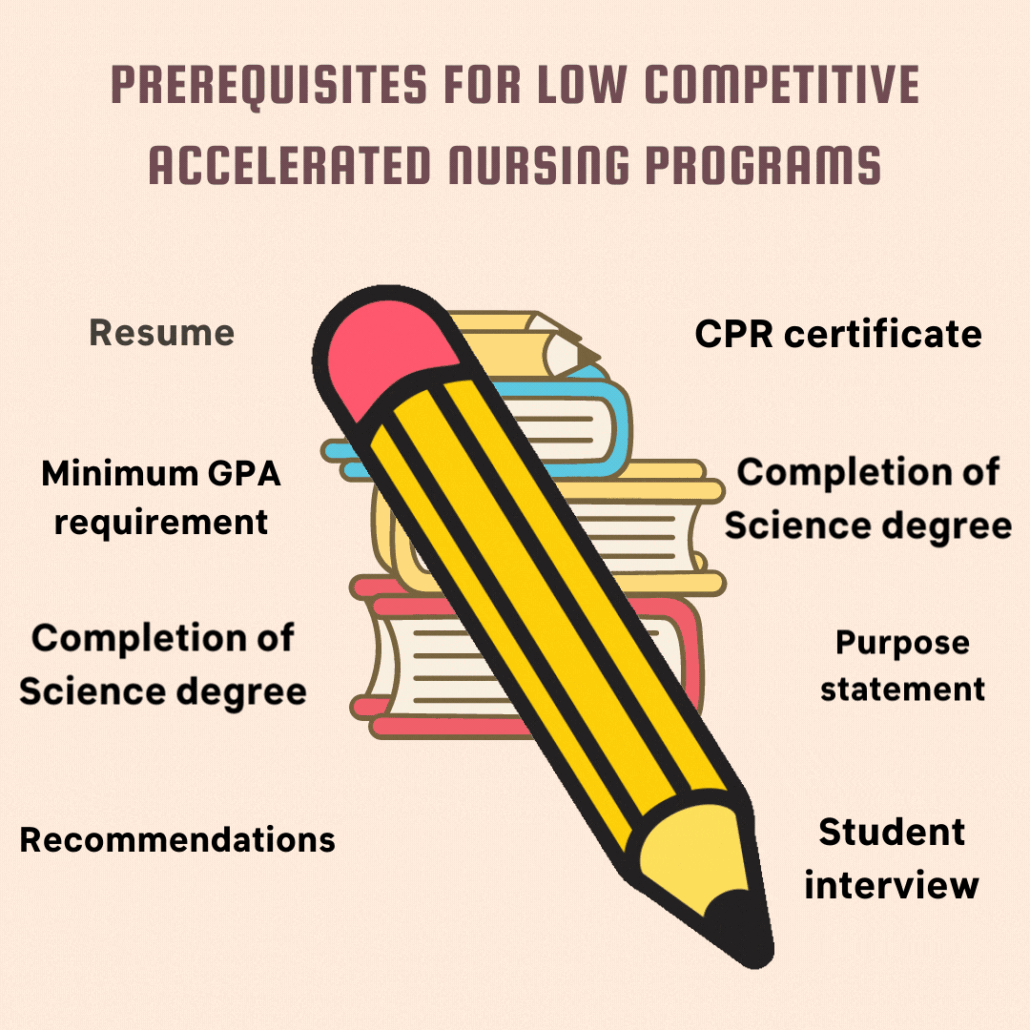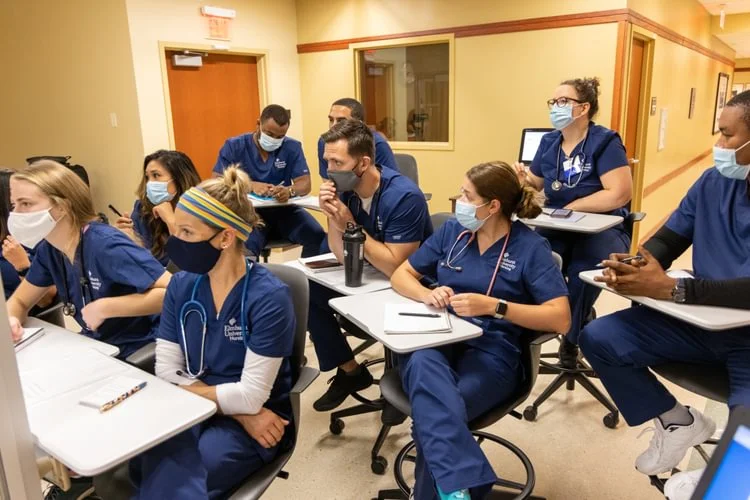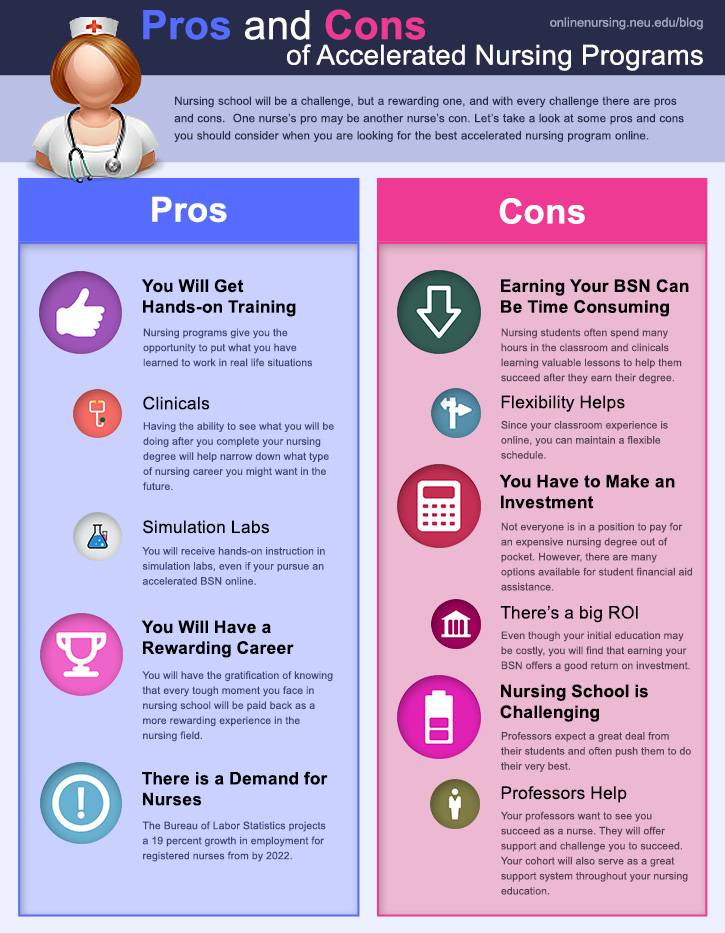Discover all you need to know about Accelerated MSN Programs, including curriculum, admission requirements, costs, and career prospects. Explore the unique advantages and potential drawbacks, and learn why accreditation matters. Find out if an online option is available and get insights into choosing the right school, financial aid, and required licenses. In this article, we delve into every aspect of these programs, providing a detailed overview to help you make an informed decision about pursuing this accelerated path in nursing education.
What is an Accelerated MSN Program?

Accelerated MSN programs are specially designed for individuals with non-nursing bachelor’s degrees who aspire to become registered nurses. These programs offer an intensive and streamlined curriculum that builds on prior education while providing comprehensive nursing training. In a condensed timeframe, students cover essential coursework in areas like anatomy, pharmacology, and clinical practice, enabling them to earn an MSN degree and become eligible for licensure.
How Long Does an Accelerated MSN Program Take?
Accelerated MSN programs are known for their efficiency in preparing students for nursing careers. Typically, these programs can be completed in 12 to 24 months, depending on the specific institution and its curriculum structure. The condensed timeline is achieved by integrating coursework with clinical rotations, providing an intensive educational experience.
The program’s duration may vary based on factors such as prior coursework, clinical requirements, and any additional specialization tracks pursued. It’s important to note that the rigorous nature of these programs demands a significant time commitment, and students should be prepared for an accelerated learning experience.
Curriculum for Accelerated MSN Programs
The curriculum of an Accelerated MSN program is carefully designed to equip students with the necessary knowledge and skills to excel in the nursing profession. It typically comprises a combination of core nursing courses, advanced practice specialization (such as nurse practitioner or clinical nurse specialist), and clinical practicum experiences.
Core courses cover a range of topics including pathophysiology, pharmacology, healthcare policy, and evidence-based practice. Additionally, students engage in hands-on clinical experiences to apply their theoretical knowledge in real-world healthcare settings. Specialization tracks allow students to focus on a specific area of nursing that aligns with their career goals.
Admission Requirements for Accelerated MSN Programs
Admission into an Accelerated MSN program involves a competitive selection process. While specific requirements may vary by institution, common prerequisites include holding a non-nursing bachelor’s degree, meeting a minimum GPA threshold (usually around 3.0), and completing certain prerequisite courses in areas like biology, chemistry, and statistics.
Additionally, applicants are typically required to submit letters of recommendation, a personal statement, and proof of relevant healthcare experience (such as volunteer work or healthcare-related employment). Some programs may also require applicants to complete standardized tests like the GRE or TEAS.
What are the prerequisites for Accelerated MSN Programs?

Prerequisites for Accelerated MSN programs typically include foundational coursework in sciences such as biology, anatomy, physiology, and chemistry. Additionally, courses in statistics and behavioral sciences may be required. These prerequisites are essential to ensure that students have a solid academic foundation before embarking on the rigorous nursing curriculum.
In some cases, institutions may offer bridge programs or specific courses to help applicants fulfill these prerequisites if they haven’t completed them during their previous education. It’s important for prospective students to carefully review and meet these requirements before applying.
How much does an Accelerated MSN Program Degree Cost?
The cost of an Accelerated MSN program varies widely based on factors such as location, institution, and whether it’s a public or private university. On average, tuition for these programs ranges from $20,000 to $40,000, but it’s crucial to factor in additional expenses like textbooks, clinical fees, and living costs.
It’s recommended to explore financial aid options, including scholarships, grants, and federal student loans, to help offset the expenses associated with pursuing an accelerated nursing degree. Additionally, some employers may offer tuition reimbursement or sponsorship for employees pursuing advanced nursing education.
Is an Accelerated MSN Program Worth It?
The value of an Accelerated MSN program depends on individual career goals and circumstances. For motivated individuals seeking a swift entry into the nursing profession, this program offers an efficient and effective route. The accelerated timeline allows for faster career advancement and the potential for higher earning potential.
However, it’s important to consider the intensive nature of these programs, which may require significant time and dedication. Additionally, prospective students should weigh the financial investment against the long-term benefits of a career in nursing. Conducting thorough research and speaking with current students and alumni can provide valuable insights to help determine if this path aligns with one’s aspirations.
Why Is Accelerated MSN Program Accreditation Important?
Accreditation is a critical factor in evaluating the quality and legitimacy of an Accelerated MSN program. Accredited programs have undergone rigorous review processes to ensure they meet established standards of education and training. Graduating from an accredited program enhances your credibility as a nurse and ensures that you receive a high-quality education.
Furthermore, accreditation is often a requirement for licensure and certification exams. Graduating from a non-accredited program may hinder your ability to become a licensed nurse, limiting your career opportunities. Therefore, it’s essential to verify the accreditation status of any program you consider.
What is the Employment Outlook for Accelerated MSN Programs?
The employment outlook for graduates of Accelerated MSN programs is highly promising. The demand for advanced practice nurses, including nurse practitioners and clinical nurse specialists, continues to grow due to factors like an aging population and the increasing complexity of healthcare. According to the Bureau of Labor Statistics, employment of nurse practitioners is projected to grow 45% from 2020 to 2030, much faster than the average for all occupations.
Additionally, MSN-prepared nurses often have opportunities for leadership roles, research positions, and specialized clinical practice. This advanced degree can open doors to a wide range of rewarding and high-paying career paths in the healthcare field.
What Makes This Major Unique?
What sets the Accelerated MSN program apart is its ability to seamlessly integrate prior education with comprehensive nursing training. This unique program caters to individuals who hold non-nursing bachelor’s degrees, providing them with an accelerated pathway to become registered nurses.
The intensive curriculum and clinical experiences foster a deep understanding of nursing theory and practice, equipping graduates with the skills needed to excel in diverse healthcare settings. This program’s emphasis on efficiency and effectiveness makes it a standout choice for those seeking a fast-track entry into the nursing profession.
Is it best to take the Accelerated MSN Program route for nursing or to take the RN-to-AMSN route?
Choosing between the Accelerated MSN program and the RN-to-AMSN route depends on individual circumstances and career goals. The Accelerated MSN program is tailored for individuals with non-nursing bachelor’s degrees, offering a rapid entry into the nursing profession. It provides a comprehensive education in nursing theory and practice in an accelerated timeframe.
On the other hand, the RN-to-AMSN route is designed for licensed registered nurses (RNs) with an associate degree in nursing. This route allows RNs to continue working while pursuing an advanced degree. It offers flexibility and the opportunity to specialize in areas like nurse education, administration, or clinical practice.
Ultimately, the choice between the two routes should be based on factors such as educational background, career objectives, and personal preferences.
Featured Accelerated MSN Programs Specialties

Accelerated MSN programs often offer a range of specialization options to cater to diverse career interests. Some popular specialties include:
- Nurse Practitioner: This specialization prepares nurses to provide primary and specialized healthcare to patients across the lifespan. Nurse practitioners can focus on areas such as family practice, pediatric care, adult-gerontology, and more.
- Clinical Nurse Specialist: Clinical nurse specialists are experts in a specific area of healthcare, such as cardiology, oncology, or mental health. They provide advanced care, conduct research, and contribute to improving patient outcomes.
- Nurse Educator: This specialty equips nurses with the skills to educate and train future nurses. Nurse educators work in academic settings, hospitals, and healthcare organizations.
- Nurse Administrator: Nurse administrators are responsible for managing healthcare facilities, overseeing staff, and ensuring the efficient delivery of care.
- Nurse Informaticist: This emerging field focuses on the integration of technology and information systems in healthcare to enhance patient care and outcomes.
These specialties offer a wealth of career opportunities and allow nurses to make a meaningful impact in their chosen area of expertise.
How to Get an Accelerated MSN Program
To get started with an Accelerated MSN program, follow these steps:
- Research Programs: Explore accredited institutions offering Accelerated MSN programs. Consider factors such as location, curriculum, and specialization options.
- Review Admission Requirements: Ensure you meet the prerequisites, which typically include a non-nursing bachelor’s degree, prerequisite coursework, and a minimum GPA.
- Prepare Application Materials: Gather transcripts, letters of recommendation, a personal statement, and any required test scores.
- Submit Applications: Apply to your selected programs within their specified deadlines.
- Secure Financial Aid: Explore scholarships, grants, and loans to help fund your education.
- Attend Interviews (if required): Some programs may require an interview as part of the selection process.
- Enroll and Begin Classes: Once accepted, enroll in the program and embark on your journey towards an Accelerated MSN degree.
Difference between AMSN and MSN
The main distinction between an Accelerated MSN (AMSN) program and a traditional MSN program lies in the entry pathway. AMSN programs are designed for individuals with non-nursing bachelor’s degrees, offering a condensed and accelerated route into nursing. These programs provide comprehensive nursing education in a shorter timeframe.
Traditional MSN programs, on the other hand, are designed for individuals who already hold a bachelor’s degree in nursing or a related field. These programs offer a deeper and more specialized education in nursing practice, often with a focus on advanced roles such as nurse practitioner, nurse educator, or nurse administrator.
Both AMSN and MSN programs lead to the same degree, but the entry requirements and curriculum structures vary to accommodate different educational backgrounds.
What to look for in a school
When choosing a school for an Accelerated MSN program, consider the following factors:
- Accreditation: Ensure the program and institution are accredited by reputable accrediting bodies in nursing education.
- Specialization Options: Evaluate if the program offers specializations that align with your career goals.
- Clinical Opportunities: Look for programs that provide diverse and meaningful clinical experiences.
- Faculty Expertise: Research the qualifications and experience of the faculty, as they play a crucial role in your education.
- Support Services: Consider the availability of academic advising, career services, and student support resources.
- Location and Accessibility: Determine if the school’s location and facilities meet your needs.
- Cost and Financial Aid: Compare tuition costs and explore available scholarships, grants, and financial aid options.
- Student Feedback and Alumni Success: Seek out reviews and testimonials from current students and alumni to gain insights into the program’s quality and outcomes.
Financial Aid and Scholarships
Explore various financial aid options to help offset the costs of an Accelerated MSN program. This may include federal student loans, grants, scholarships, and work-study programs. Additionally, some employers offer tuition reimbursement or sponsorship for employees pursuing advanced nursing education. It’s advisable to research and apply for scholarships specific to nursing or healthcare.
Required Licenses and Available Certifications
Upon completing an Accelerated MSN program, graduates must obtain licensure to practice as registered nurses. This typically involves passing the NCLEX-RN (National Council Licensure Examination for Registered Nurses). Depending on the chosen specialization, additional certifications may be required, such as nurse practitioner or clinical nurse specialist certifications. These credentials demonstrate advanced proficiency in specific areas of nursing practice.
Can I get my AMSN in Nursing Online?
Yes, many institutions offer Accelerated MSN programs with an online format. Online AMSN programs provide a flexible learning environment, allowing students to complete coursework remotely. This option is especially beneficial for individuals who may have work or family commitments that make attending traditional on-campus classes challenging.
While the didactic portion of the program can often be completed online, it’s important to note that clinical experiences typically require in-person attendance. Institutions may work with students to arrange clinical placements in their local area.
Advantages of ASMN:
- Accelerated Entry: ASMN programs offer a swift route into the nursing profession, allowing individuals with non-nursing backgrounds to transition efficiently. This expedited path enables quicker entry into the workforce, saving time and resources.
- Diverse Career Opportunities: Graduates of ASMN programs are equipped with a comprehensive skill set and knowledge base, opening doors to a wide range of nursing specialties and advanced practice roles. This diversity in career options enhances professional growth and potential for higher earnings.
- Intensive Clinical Experience: ASMN programs prioritize hands-on clinical training, providing students with robust exposure to real-world healthcare settings. This immersive experience strengthens clinical competencies, ensuring graduates are well-prepared for the demands of nursing practice.
- Leveraging Prior Education: ASMN programs capitalize on existing educational backgrounds, allowing students to build on their prior knowledge and skills. This integration facilitates a seamless transition into the nursing curriculum, maximizing the efficiency of the educational process.
- High Demand in Healthcare: The healthcare industry continues to experience a growing demand for qualified nurses. ASMN graduates are well-positioned to meet this demand, making them sought-after professionals in a dynamic and essential field.

Disadvantages of ASMN:
- Intensive Time Commitment: ASMN programs are rigorous and demanding, requiring a significant time commitment from students. The accelerated nature of the curriculum may lead to a fast-paced learning environment, which can be challenging for some individuals to manage.
- Limited Flexibility: Due to the condensed schedule, ASMN programs may offer limited flexibility in terms of course sequencing and scheduling. This can be a drawback for students with personal or professional commitments that require a more flexible academic timeline.
- Potential for Academic Intensity: The concentrated coursework in ASMN programs can be academically intense, necessitating a high level of dedication and focus. This intensity may not be suitable for everyone and could lead to higher stress levels for some students.
- Clinical Placement Challenges: Securing appropriate clinical placements can be a logistical challenge for ASMN programs, especially in competitive healthcare environments. Students may need to be flexible and resourceful in finding suitable clinical sites.
- Higher Financial Investment: ASMN programs, while efficient, can be financially demanding. Tuition costs, along with associated fees, textbooks, and clinical expenses, can add up quickly. It’s crucial for students to carefully plan and budget for these costs.
Conclusion:
In conclusion, Accelerated MSN programs offer an efficient and effective pathway for individuals with non-nursing backgrounds to enter the nursing profession. These programs provide a rigorous curriculum that combines theoretical knowledge with hands-on clinical experiences, preparing graduates for diverse and rewarding careers in healthcare.
Frequently Asked Questions
1. Are Direct-Entry MSN Programs Hard to Get Into?
Entry into Direct-Entry MSN programs can be competitive due to the accelerated nature and high demand for these programs. Institutions typically have specific admission criteria, including prerequisite coursework, minimum GPA requirements, letters of recommendation, and sometimes standardized test scores. It’s advisable for prospective students to meet all the stated prerequisites and present a strong application to enhance their chances of acceptance.
2. Is There a Waiting List for Direct-Entry MSN Programs?
While some Direct-Entry MSN programs may have waiting lists, it’s not a universal practice. The availability of slots depends on factors such as program capacity, demand, and the number of qualified applicants. It’s recommended to inquire directly with the institutions offering the program for their specific admission procedures and whether they maintain a waiting list.
3. Do Direct-Entry MSN Programs Have to Be Accredited?
Yes, it is highly advisable to choose a Direct-Entry MSN program that is accredited by reputable accrediting bodies. Accreditation ensures that the program meets established standards of quality in nursing education. Graduating from an accredited program is crucial for obtaining licensure and pursuing further education or specialization in nursing.
4. Are Online Direct-Entry MSN Programs Accredited?
Yes, accredited online Direct-Entry MSN programs meet the same rigorous standards as their on-campus counterparts. It’s important to verify the accreditation status of any online program you consider. Reputable institutions offering online programs will have accreditation from recognized accrediting bodies.
5. Are Scholarships Available for Direct-Entry MSN Students?
Yes, scholarships and financial aid options are often available for Direct-Entry MSN students. These can come from various sources including the institution, private organizations, and government programs. Prospective students are encouraged to research and apply for scholarships specific to nursing or healthcare. Additionally, institutions may have their own scholarship opportunities for students in their programs.
6. Can International Students Apply to Direct-Entry MSN Programs?
Yes, many Direct-Entry MSN programs welcome international students. However, it’s important for international applicants to carefully review the admission requirements, including language proficiency exams like the TOEFL or IELTS. Additionally, they may need to navigate visa and immigration processes. It’s advisable to contact the admissions offices of specific programs for guidance tailored to international applicants.


